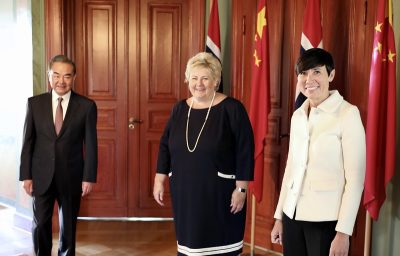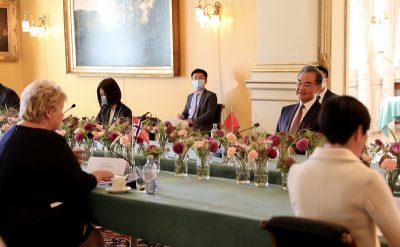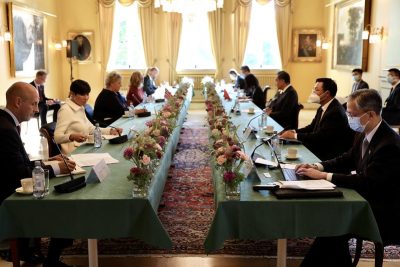NEWS ANALYSIS: Last week’s brief visit by China’s foreign minister Wang Yi didn’t resolve any of the issues that have given China such a poor reputation in Norway over the past several years. While Wang and Norwegian Foreign Minister Ine Eriksen Søreide seemed to “agree to disagree” on the thorniest issues, like China’s persecution of its Uighur minority and its crackdown on democracy in Hong Kong, there are signs that Norway is taking on a tougher tone.

Søreide found some nice things to say after her relatively short time with Wang, thanking him for including Norway on a European tour that also included stops in Italy, the Netherlands, France and Germany. Wang’s visit to Oslo, which Søreide pointed out was the first by a Chinese foreign minister since 2006, was widely believed to be tied to Norway’s recent election to a seat on the UN Security Council. That boosts Norway’s role in the world, with Søreide noting that “we touched upon international issues like the fact that we are going into the Security Council in January 1.”
She claimed after the meetings that she and Wang “touched on trade,” including a free trade agreement between Norway and China that’s been under discussion for years. They also had “extensive discussions on human rights,” she said, as well as on the Covid-19 pandemic, which originated in China. Hong Kong was also on her agenda: “There’s a general fear that ‘one country, two systems’ and Hong Kong’s Basic Law (its own form of a constitution) are in danger,” she told newspaper Aftenposten.
‘Open dialogue’
“It’s a positive development that we have an open dialogue on human rights questions,” Søreide insisted after her meetings and dinner with Wang in Oslo. She was referring to the six-year diplomatic freeze between China and Norway that began when the Norwegian Nobel Committee awarded the Nobel Peace Prize for 2010 to the now-late Chinese dissident and human rights activist Liu Xiaobo. Even though the Norwegian government has nothing to do with decisions made by the Nobel Committee, top Chinese officials refused to speak to their Norwegian counterparts until they arrived at a controversial peace pact of their own in late 2016.
Wang fired off another warning at a brief after-dinner press conference that China won’t tolerate anyone meddling in what he and his government colleagues view as China’s internal affairs. They simply won’t seem to acknowledge how most of the rest of the world cares very much indeed about maintaining democracy and free speech in Hong Kong, and condemning what’s even been viewed as genocide of Uighurs in the Xinjiang region of China.

Søreide diplomatically referred to “the situation” in Xinjiang, but claimed the two did indeed “discuss” it, adding that “we are worried about it” and that Norway “has expressed that several times earlier.” She told Aftenposten that the two “also discussed Hong Kong, where we see that the election is postponed and that opposition politicians are being arrested.”
There clearly were no resolutions, and Søreide was likely not nearly as tough on Wang as other politicians wanted her to be. China’s massive human rights violations and crackdown on what has been a free and prosperous society in Hong Kong has created so much concern in Norway that it’s even left opposite ends of the political spectrum agreeing on something: Members of Parliament Petter Eide of the Socialist Left party (SV) and Sylvi Listhaug of the conservative Progress Party hardly ever have anything in common, but both had called up Søreide and Prime Minister Erna Solberg to condemn China’s human rights violations during the visit.
“It’s not acceptable for a communist dictatorship to take away the rights of the people of Hong Kong,” Listhaug told Norwegian Broadcasting (NRK) just before Wang’s visit. She didn’t talk that tough when she was still a member of Solberg’s Conservative government coalition, but now Listhaug claims it’s important that China not acquire more power and influence. She said she also supports sanctions against the country.
So does Eide, who told NRK that he hoped Norway “would dare to put forth criticism of the human rights violations in China, even though Norway has boosted its economic relations with China.” He supports demands for a UN-led inspection of internment camps in Xinjiang, something Norway will now be in a position to support at the Security Council.

While China, as a permanent member, can veto any such demand, many commentators claimed that Wang’s European tour last week reflected China’s need to carry out at least some damage control. Chinese leaders can’t ignore all the criticism being hurled at them on both sides of the Atlantic and farther afield. Concerns for Taiwan are also high, and Wang was also met by demonstrators outside the state guest house in Oslo where he and Søreide met. In addition to several MPs and top politicians including Trine Skei Grande of the Liberal Party, demonstrators included representatives from Norway’s Tibet Committee, Uighur Committee, Hong Kong Committee and Amnesty International.
One of Søreide’s own government colleagues, Guri Melby of the Liberal Party, has even nominated the pro-democracy movement in Hong Kong for the Nobel Peace Prize, albeit before she became education minister last spring.
‘Sharper line’
John Peder Egenæs of Amnesty International said his organization has seen some “uplifting signals” that Norway will take a “sharper line” towards China. “We interpret (the signals) as a sign of increased consciousness among Norwegian politicians about China’s brutality,” Egenæs told NRK. The US, Britain and many other countries much bigger than Norway have also been highly critical of China.
Wang may well have picked up such signals too. Aftenposten reported that China’s own foreign ministry quoted Wang as telling Søreide in their meeting that “China and Norway must handle sensitive issues in an appropriate manner in order to keep their relation, which has become better thanks to hard work, from becoming worse again.”
“We have clearly expressed our concerns about the human rights situation in Xinjiang and developments in Hong Kong,” Audun Halvorsen, state secretary in the foreign minister and a colleague of Søreide’s within the Conservative Party, told NRK. Now those concerns can also be expressed at the UN Security Council.
“We have some issues where we don’t always agree,” Søreide stated after her meeting with Wang, “and the openness we have for that is something we appreciate.”
NewsInEnglish.no/Nina Berglund

